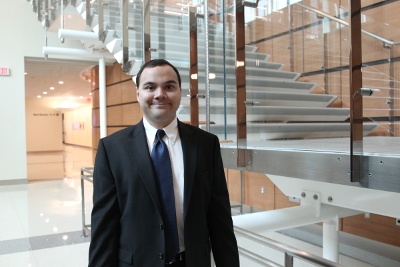Autism and the Workplace
 During April, we celebrate Autism Awareness Month, with the goal of raising awareness about people with autism spectrum disorder (ASD). But for Social Security's Ticket to Work (Ticket) program team, Autism Awareness Month is also an opportunity to recognize the strengths that people who have ASD bring to the workplace.
During April, we celebrate Autism Awareness Month, with the goal of raising awareness about people with autism spectrum disorder (ASD). But for Social Security's Ticket to Work (Ticket) program team, Autism Awareness Month is also an opportunity to recognize the strengths that people who have ASD bring to the workplace.
ASD is a neuro-developmental disorder that varies in severity and may include difficulty with social interaction and communication and specific types of patterns of thought and behavior. People with ASD may have questions about what it means for their employment options and see their ASD as a barrier to employment. But employers have started recognizing that many people with ASD offer a variety of strengths, such as:
- Excellent concentration
- Strong memory
- Attention to detail
- Ability to recognize patterns and deviations
- High dependability
Discover more about employment resources and the strengths that people with ASD can bring to their workplaces from Autism Speaks.
Larry's Journey
As Larry prepared for the transition from high school to the workplace, he and his mother were unsure of what his work options would be. The staff at his school helped Larry recognize his strengths and interests. They then collaborated with the State Vocational Rehabilitation (VR) agency, where Larry and his family learned about Social Security's Ticket to Work (Ticket) program. Through the Ticket program, Larry received career counseling, job training, assistance looking for work and other individualized supports and services to help him navigate and succeed on the path to work.
Larry's next step was an internship where he learned administrative tasks and developed soft skills to help him adapt to an office setting. His work ethic and follow-through on finishing tasks made him a valuable team member, for which he took a lot of pride.
Ready for a full-time position, Larry's VR counselor helped him through the job search until he landed a job where he helps set up 27 conference rooms on a daily basis. It requires logistics planning, strong visual memory, attention to detail and customer service skills (which he cultivated in his earlier job training).
Continuous supports
Finding full-time employment wasn't the end of the supports and services Larry received through the Ticket program. Many people, like Larry, need ongoing support to maintain employment and increase their earnings over time. Through the Ticket program, there are options.
You can find resources for ASD and the workplace from the U.S. Department of Labor’s Office of Disability Employment Policy (ODEP).
Although Larry's VR case ended 90 days after he started his full-time job, his State VR agency had a collaborative agreement, known as Partnership Plus, with a Ticket to Work Employment Network (EN). ENs offer services to prepare for and find work, but they also offer continuous supports that help individuals with career development and success on the job.
For people with ASD, these supports can include continued job coaching, skills training and assistance navigating issues and obstacles in the workplace and requesting accommodations.
So as you look for work or help a family member who has ASD consider employment options, remember that employers recognize the strengths that neuro-diversity brings to the workplace and that there may be supports and services available through the Ticket program to help you find the job that fits.
Learn More
To learn more about the Ticket program, call the Ticket to Work Help Line at 1-866-968-7842 or 1-866-833-2967 (TTY) Monday through Friday, 8 a.m. to 8 p.m. ET. Ask a representative to send you a list of service providers or find providers on your own with the Ticket program Find Help tool.